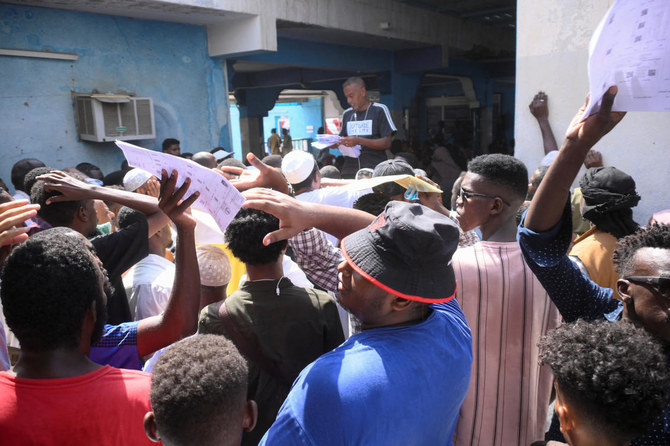PORT SUDAN: Thousands have fled a southern Sudan town, residents said Monday, after attacks by the paramilitary Rapid Support Forces, at war with the army for nearly six months.
RSF fighters on dozens of armed vehicles attacked the town of Wad Ashana, on the border between North Kordofan and White Nile states, on Saturday, according to residents.
“My neighbor and my cousin were both killed in the crossfire. It was hours of terror,” Al-Tayeb Abdelbaqi told AFP from El Odaydab, a town 10 kilometers away to which he could eventually flee, sheltering with a relative along with three other families.
By early September, the war between Sudan’s army chief Abdel Fattah Al-Burhan and his former deputy, RSF commander Mohamed Hamdan Daglo, which began on April 15, had killed nearly 7,500 people, according to the Armed Conflict Location & Event Data (ACLED) project.
The worst of the violence has been concentrated in Khartoum and the western region of Darfur, but North Kordofan — a crossroads between the capital and Darfur — has also seen fighting.
Almost 4.3 million people have been displaced by the fighting within Sudan, in addition to around 1.2 million more who have fled across borders.
Dozens of families like Abdelbaqi’s, who fled to save their lives but left everything behind, were holed up in schools in the area.
“We left with only the clothes on our backs,” said another resident, Ahmed, who used to own a store in Wad Ashana and asked to only be identified by his first name for fear of retaliation.
He said the local market “had been completely looted.” The same allegation has followed RSF attacks across Sudan since the war began.
Footage posted to social media on Sunday by the RSF claimed to show fighters “taking over the Wad Ashana garrison in North Kordofan and advancing toward Kosti,” the last major town on the road to South Sudan.
The Sudanese Armed Forces have not yet issued any comment on the situation there.
According to Abdelbaqi, the area had been spared the fighting, until last week, when “an army force set up camp west of town.”
Three days later, “the RSF attacked the city, completely overtaking it and pushing the army” 35 kilometers east, he said.
Already one of the world’s poorest countries, the war has brought a humanitarian catastrophe to Sudan, where millions are on the brink of famine, and diseases are spreading, according to the United Nations.
Thousands flee Sudan town as war grips country’s south: witnesses
https://arab.news/gwqy9
Thousands flee Sudan town as war grips country’s south: witnesses

- RSF fighters attacked the town of Wad Ashana, on the border between North Kordofan and White Nile states, on Saturday
Israel’s Netanyahu says it would be a ‘mistake’ to hold elections now

- Failure to pass the budget by March 31 would trigger early elections
JERUSALEM: Israeli Prime Minister Benjamin Netanyahu said on Tuesday that holding elections now would be a “mistake,” as he faces the possibility of a snap vote should he fail to pass a national budget.
The budget will have its first reading on Wednesday in Israel’s parliament, where Netanyahu’s coalition is only able to exercise a majority thanks to the uncertain cooperation of a former ally.
“Of course I’m concerned... I think we’re in a very sensitive situation,” Netanyahu said at a televised press conference.
Failure to pass the budget by March 31 would trigger early elections.
“I think the last thing we need right now is elections. We’ll have elections later on this year, but I think it’s a mistake to have them now” he said.
Elections are due to be held by November.
The leader of Likud, Israel’s main right-wing party, Netanyahu holds the record for the longest time served as Israel’s premier — more than 18 years in total over several stints since 1996 — and has already said he intends to run again.
In the last elections, Likud won 32 seats in the Knesset, its ultra-Orthodox allies 18, and a far-right alliance 14.
Some of Netanyahu’s ultra-Orthodox allies formally left his government last year, but for now refuse to bring it down.
However, they are reluctant to vote for the budget until the premier makes good on a promise to pass a law allowing their community to avoid military conscription.
Netanyahu’s current term began with a controversial judicial overhaul plan that sparked months of mass protests, with tens of thousands of Israelis taking to the streets almost daily.














